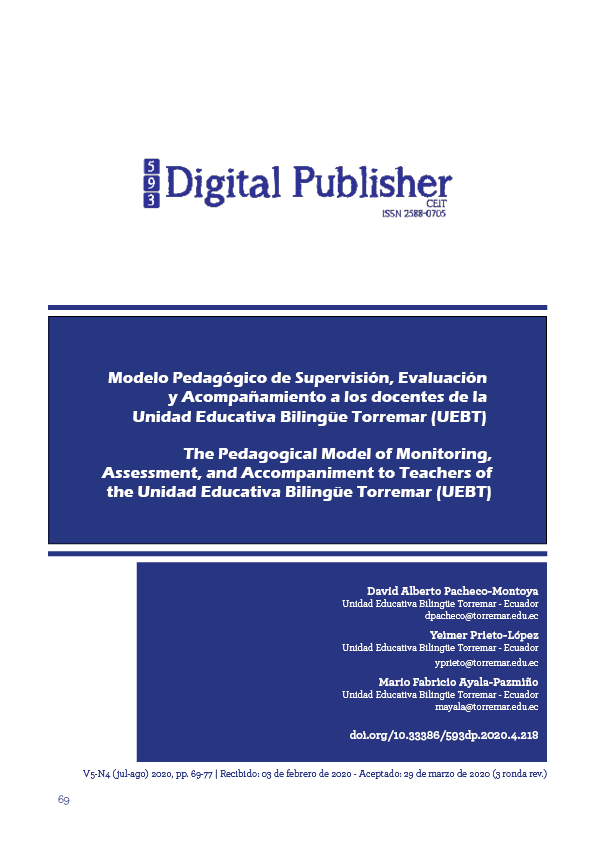The Pedagogical Model of Monitoring, Assessment, and Accompaniment to Teachers of the Unidad Educativa Bilingüe Torremar (UEBT)
Main Article Content
Abstract
In this paper, we offer a new experience on supervision and pedagogical support, which has been developed by the Academic Coordination of the UEBT. It has been done in the last two years, as a unique practice in the Ecuadorian context of education, particularly in private schools, and it is one of the few that we have been able to systematize and investigate in Latin America.
The research processes contextualized to our educational institution, are developed from the limitations presented by teachers in an initial pedagogical diagnosis, consisting of the direct aulic observation of our entire population of teachers throughout the institution in every school term. This was applied by the Academic Coordination promptly and aimed at obtaining a pedagogical and methodological didactic result in a comprehensive and individualized manner in each of the UEBT teachers. The objective was to obtain better results in adherence to the scientific theories that underpin the Teaching for Understanding (EpC, in its Spanish acronym) methodology, which we have been applying and validating in the most appropriate educational practice and research techniques. It would enable its coherent implementation, as well as offering the theoretical and methodological foundations that support the Pedagogical Model of Supervision, Evaluation, and Didactic and Methodological Accompaniment.
Downloads
Article Details
1. Derechos de autor
Las obras que se publican en 593 Digital Publisher CEIT están sujetas a los siguientes términos:
1.1. 593 Digital Publisher CEIT, conserva los derechos patrimoniales (copyright) de las obras publicadas, favorece y permite la reutilización de las mismas bajo la licencia Licencia Creative Commons 4.0 de Reconocimiento-NoComercial-CompartirIgual 4.0, por lo cual se pueden copiar, usar, difundir, transmitir y exponer públicamente, siempre que:
1.1.a. Se cite la autoría y fuente original de su publicación (revista, editorial, URL).
1.1.b. No se usen para fines comerciales u onerosos.
1.1.c. Se mencione la existencia y especificaciones de esta licencia de uso.
References
Almendros, H. (2002). Exposición crítica de su proceso en Cuba y sugestiones para una readaptación posible. Santiago de Cuba, Cuba: Universidad de Oriente, Departamento de Extensión y Relaciones Culturales.
Alvarado Oyarce, O. (1990). Supervisión educativa: Teoría y práctica. Perú: Editorial Educativa INIDE.
De La Orden, A. (2006). La función de la inspección técnica en el contexto de la gestión del sistema educativo. Madrid, España: Cuadernos de Capacitación Docente, OEI.
Felten, P., & Chick, N. (2018). Is SoTL a signature pedagogy of educational development? To Improve the Academy, 37(1), 4-16. doi:10.1002/tia2.20077
Fermín, M. (1980). Tecnología de la supervisión docente. Buenos Aires, Argentina: Ed. Kapeluz S.A.
Franseth, J. (1967). Supervisión escolar como guía. DF, México: Ed. Trillas S.A.
Fuentes Sordo, C. O. E., Estrada, I. E., & Jon, L. B. (2009). Organización escolar y supervisión educativa: Necesidades de la dirección educacional. Habana, Cuba: Congreso Pedagogía.
García Hoz, V. (2008). La inspección escolar y sus aspectos humanos. En. Revista Ciencias de la Educación, 150(Abril-Junio), 12-15.
Guarderas, W. (1993). La supervisión interna de instituciones educativas: Guía técnica. Ecuador.
Kedraka, K., & Rotidi, G. (2017). University pedagogy: A new culture is emerging in Greek higher education. International Journal of Higher Education, 6(3), 147-153. Retrieved from https://eric.ed.gov/?id=EJ1146581
Lam, M. (2019). Effects of Canada’s increasing linguistic and cultural diversity on educational policy, programming and pedagogy. Journal of Contemporary Issues in Education, 14(2), 16-32. Retrieved from https://journals.library.ualberta.ca/jcie
Mosher, R. L. Y., & Purpel, D. E. (2011). Nuevo enfoque de la supervisión. Buenos Aires, Argentina: Ed. Ateneo.
Pérez Figueiras, E. (2002). Historia de la inspección escolar en Cuba (Tetis, Doctor en Ciencias Pedagógicas, Ciudad de la Habana).
Perkins, D. (1995). La escuela inteligente. Del adiestramiento de la memoria a la educación de la mente. Barcelona, Spain: Gedisa.
Stone Wiske, M. (1999): La enseñanza para la comprensión. Vinculación entre la investigación y la práctica. Buenos Aires, Argentina: Paidós.
Udas, K., Brosnan, S., & Wade, B. (2017). Let’s talk pedagogy: An agile approach to testing and demonstrating. Education Technology Solutions, (81), 46-48. Retrieved from https://search.informit.com.au/documentSummary;dn=
;res=IELBUS
Webb, D. (2017). Educational archaeology and the practice of utopian pedagogy. Pedagogy, Culture & Society, 25(4), 551-566. doi:10.1080/14681366.2017.1291534
Wrigley, C., & Straker, K. (2017). Design thinking pedagogy: The educational design ladder. Innovations in Education and Teaching International, 54(4), 374-385. doi:10.1080/14703297.2015.1108214
Žogla, I. (2018). Science of pedagogy: Theory of educational discipline and practice. Journal of Teacher Education for Sustainability, 20(2), 31-43. doi:10.2478/jtes-2018-0013

